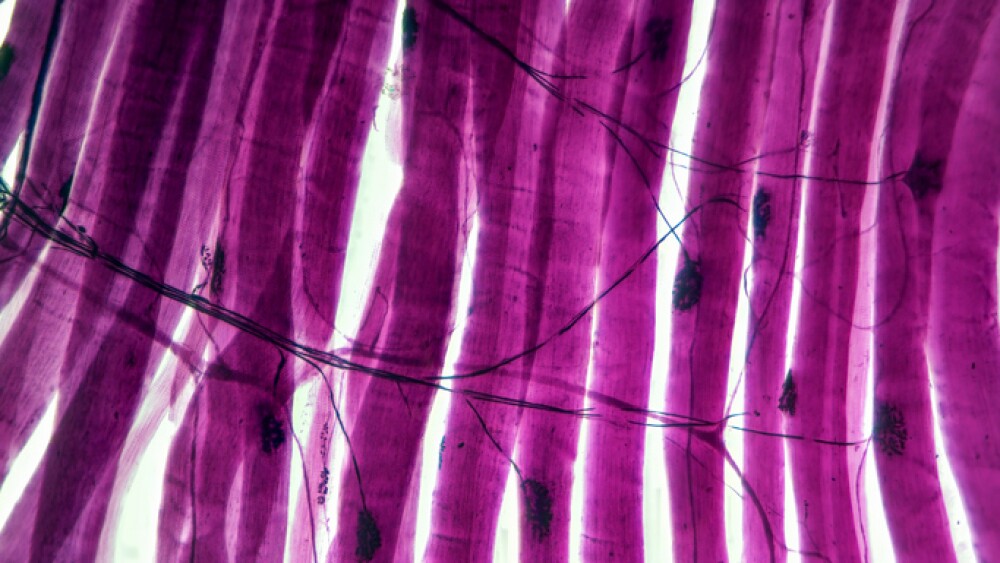Dyne Therapeutics, Inc. (Nasdaq: DYN), a muscle disease company focused on advancing innovative life-transforming therapeutics for people living with genetically driven diseases, is presenting new in vivo data from DYNE-101, its myotonic dystrophy type 1 (DM1) candidate, at the American Society of Gene & Cell Therapy.
- Initiation of Dosing in Multiple Ascending Dose Clinical Trial for DYNE-101 in Patients with Myotonic Dystrophy Type 1 Anticipated in Mid-2022 -
WALTHAM, Mass., May 16, 2022 (GLOBE NEWSWIRE) -- Dyne Therapeutics, Inc. (Nasdaq: DYN), a muscle disease company focused on advancing innovative life-transforming therapeutics for people living with genetically driven diseases, is presenting new in vivo data from DYNE-101, its myotonic dystrophy type 1 (DM1) candidate, at the American Society of Gene & Cell Therapy (ASGCT) 25th Annual Meeting today demonstrating robust knockdown of DMPK RNA in multiple muscles with low monthly dosing.
“We are excited to present these new data that show monthly dosing of DYNE-101 led to a substantial knockdown of toxic human nuclear DMPK RNA in cardiac and skeletal muscle in the hTfR1/DMSXL mouse model as well as reduction of wild-type DMPK RNA in muscles of non-human primates. Additionally, GLP toxicology data support a favorable safety profile for our DM1 candidate,” said Oxana Beskrovnaya, Ph.D., Dyne’s chief scientific officer. “These findings combined with previous data demonstrating correction of splicing, support the potential for DYNE-101 to be a disease-modifying therapy with low, infrequent dosing. We look forward to evaluating DYNE-101 in our planned global multiple ascending dose clinical trial in patients with DM1.”
DM1 is a rare, progressive, genetic disease caused by an abnormal expansion in the number of CTG triplet repeats in a region of the DMPK gene that causes toxic RNA to cluster in the nucleus, forming foci and altering the splicing of multiple proteins essential for normal cellular function. As a result of this altered splicing, people living with DM1 typically experience progressive weakness of skeletal, cardiac and smooth muscle. There are no approved disease-modifying therapies for DM1. DYNE-101 is designed to enable targeted delivery to muscle tissue and address the genetic basis of the disease. The new data being presented during ASGCT evaluated monthly repeat doses of DYNE-101 in an innovative hTfR1/DMSXL mouse model developed by Dyne and in non-human primates (NHPs).
The hTfR1/DMSXL model expresses the human transferrin 1 receptor (TfR1) and carries a human DMPK gene with more than 1,000 CTG repeats that represents a severe DM1 phenotype. In the hTfR1/DMSXL model, DYNE-101 achieved enhanced toxic human nuclear DMPK RNA knockdown in skeletal and cardiac muscle with four monthly doses of 5 mg/kg relative to a single dose. Importantly, the level of DMPK RNA knockdown observed with this 5 mg/kg repeat dosing regimen was comparable to that observed previously with a single dose of 10 mg/kg of DYNE-101.
While not a disease model for DM1, in NHPs, DYNE-101 demonstrated up to 70 percent knockdown of wild-type DMPK RNA in cardiac, smooth and skeletal muscle after two monthly doses at 10 mg/kg.
DYNE-101 was also found to be well tolerated in a 13-week GLP toxicology study in NHPs, with no dose limiting toxicity observed up to a maximally feasible dose. There were no changes in cardiac, respiratory, neurologic, or ophthalmic endpoints, and no observed effects on kidney or liver function or coagulation.
Data being featured during ASGCT today will be made available in the Scientific Publications & Presentations section of Dyne’s website following the session:
Oral Presentation: Repeat Dosing with DYNE-101 is Well Tolerated and Leads to a Sustained Reduction of DMPK RNA Expression in Key Muscles for DM1 Pathology in hTfR1/DMSXL Mice and NHPs (Abstract #17)
Session: Oligonucleotide Therapeutics
Time: 10:45 a.m. ET
About Myotonic Dystrophy Type 1 (DM1)
DM1 is a rare, progressive, genetic disease that affects skeletal, cardiac and smooth muscle. It is a monogenic, autosomal dominant disease caused by an abnormal trinucleotide expansion in a region of the DMPK gene. This expansion of CTG repeats causes toxic RNA to cluster in the nucleus, forming nuclear foci and altering the splicing of multiple proteins essential for normal cellular function. This altered splicing results in a wide range of symptoms. People living with DM1 typically experience progressive weakness of major muscle groups, which can affect mobility, breathing, heart function, speech, digestion and vision as well as cognition. DM1 is estimated to affect more than 40,000 people in the United States and over 74,000 people in Europe, but there are currently no approved disease-modifying therapies.
About DYNE-101
DYNE-101 is Dyne’s therapeutic candidate being developed for people living with myotonic dystrophy type 1 (DM1). DYNE-101 consists of an antigen-binding fragment antibody (Fab) conjugated to an antisense oligonucleotide (ASO) to enable targeted muscle tissue delivery with the goal of reducing toxic DMPK RNA in the nucleus, releasing splicing proteins, allowing normal mRNA processing and translation of normal proteins, and potentially stopping or reversing the disease. Dyne has generated comprehensive preclinical data supporting its DM1 program, including reduction of nuclear foci and correction of splicing in patient cells, robust knockdown of toxic human nuclear DMPK RNA and correction of splicing in a novel in vivo model developed by Dyne, reversal of myotonia after a single dose in a disease model, and enhanced muscle distribution as evidenced by significant reduction in wild-type DMPK RNA in non-human primates.
About Dyne Therapeutics
Dyne Therapeutics is building a leading muscle disease company dedicated to advancing innovative life-transforming therapeutics for people living with genetically driven diseases. With its proprietary FORCE™ platform, Dyne is developing modern oligonucleotide therapeutics that are designed to overcome limitations in delivery to muscle tissue seen with other approaches. Dyne has a broad portfolio of programs for serious muscle diseases, including candidates for myotonic dystrophy type 1 (DM1), Duchenne muscular dystrophy (DMD) and facioscapulohumeral muscular dystrophy (FSHD). For more information, please visit https://www.dyne-tx.com/, and follow us on Twitter, LinkedIn and Facebook.
Forward-Looking Statements
This press release contains forward-looking statements that involve substantial risks and uncertainties. All statements, other than statements of historical facts, contained in this press release, including statements regarding Dyne’s strategy, future operations, prospects and plans, objectives of management, the potential of the FORCE platform, the expected timeline for dosing patients in trials, the anticipated design of the trials, constitute forward-looking statements within the meaning of The Private Securities Litigation Reform Act of 1995. The words “anticipate,” “believe,” “continue,” “could,” “estimate,” “expect,” “intend,” “may,” “might,” “objective,” “ongoing,” “plan,” “predict,” “project,” “potential,” “should,” or “would,” or the negative of these terms, or other comparable terminology are intended to identify forward-looking statements, although not all forward-looking statements contain these identifying words. Dyne may not actually achieve the plans, intentions or expectations disclosed in these forward-looking statements, and you should not place undue reliance on these forward-looking statements. Actual results or events could differ materially from the plans, intentions and expectations disclosed in these forward-looking statements as a result of various important factors, including: uncertainties inherent in the identification and development of product candidates, including the conduct of research activities and the initiation and completion of preclinical studies and clinical trials; uncertainties as to the availability and timing of results from preclinical studies; uncertainties as to the timing of and Dyne’s ability to submit and obtain regulatory clearance for investigational new drug applications and other regulatory filings and initiate clinical trials, including with respect to its response to the DYNE-251 clinical hold letter and its ability to obtain regulatory clearance of the DYNE-251 IND; whether results from preclinical studies will be predictive of the results of later preclinical studies and clinical trials; whether investigators and regulatory agencies will agree with the design of Dyne’s planned clinical trials; whether Dyne’s cash resources will be sufficient to fund the Company’s foreseeable and unforeseeable operating expenses and capital expenditure requirements; uncertainties associated with the impact of the COVID-19 pandemic on Dyne’s business and operations; as well as the risks and uncertainties identified in Dyne’s filings with the Securities and Exchange Commission (SEC), including the Company’s most recent Form 10-Q and in subsequent filings Dyne may make with the SEC. In addition, the forward-looking statements included in this press release represent Dyne’s views as of the date of this press release. Dyne anticipates that subsequent events and developments will cause its views to change. However, while Dyne may elect to update these forward-looking statements at some point in the future, it specifically disclaims any obligation to do so. These forward-looking statements should not be relied upon as representing Dyne’s views as of any date subsequent to the date of this press release.
Contact:
Dyne Therapeutics
Amy Reilly
areilly@dyne-tx.com
857-341-1203






